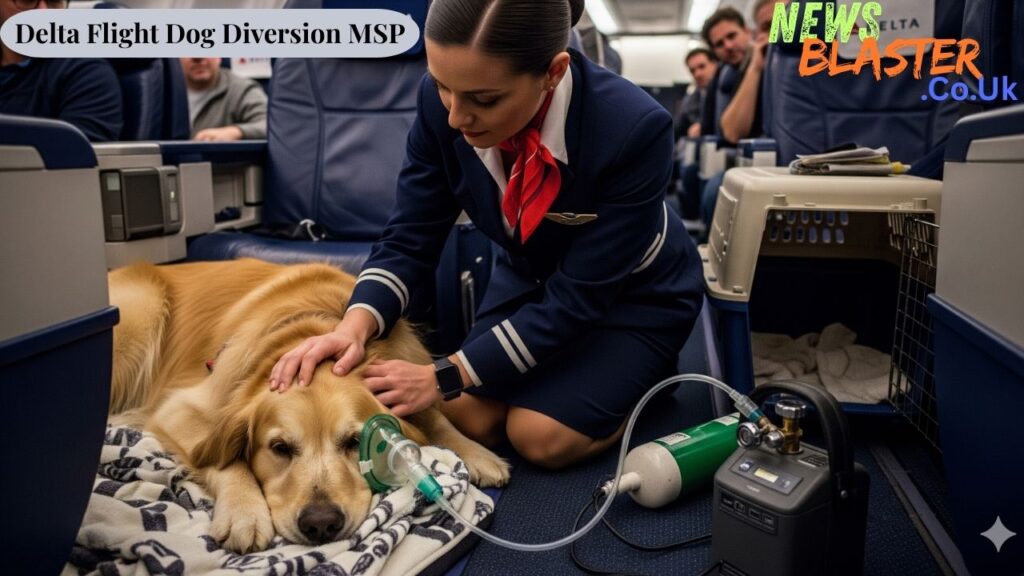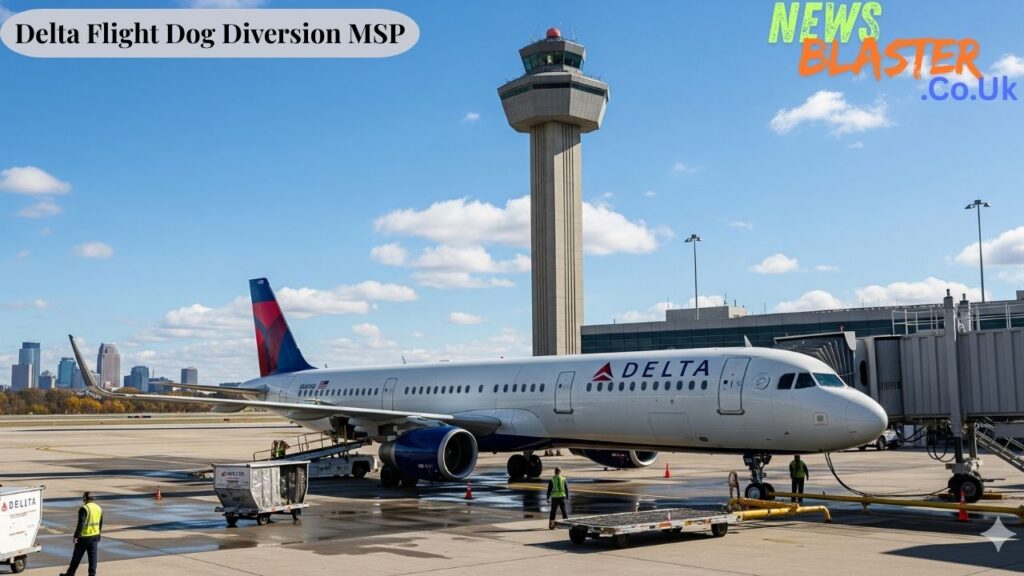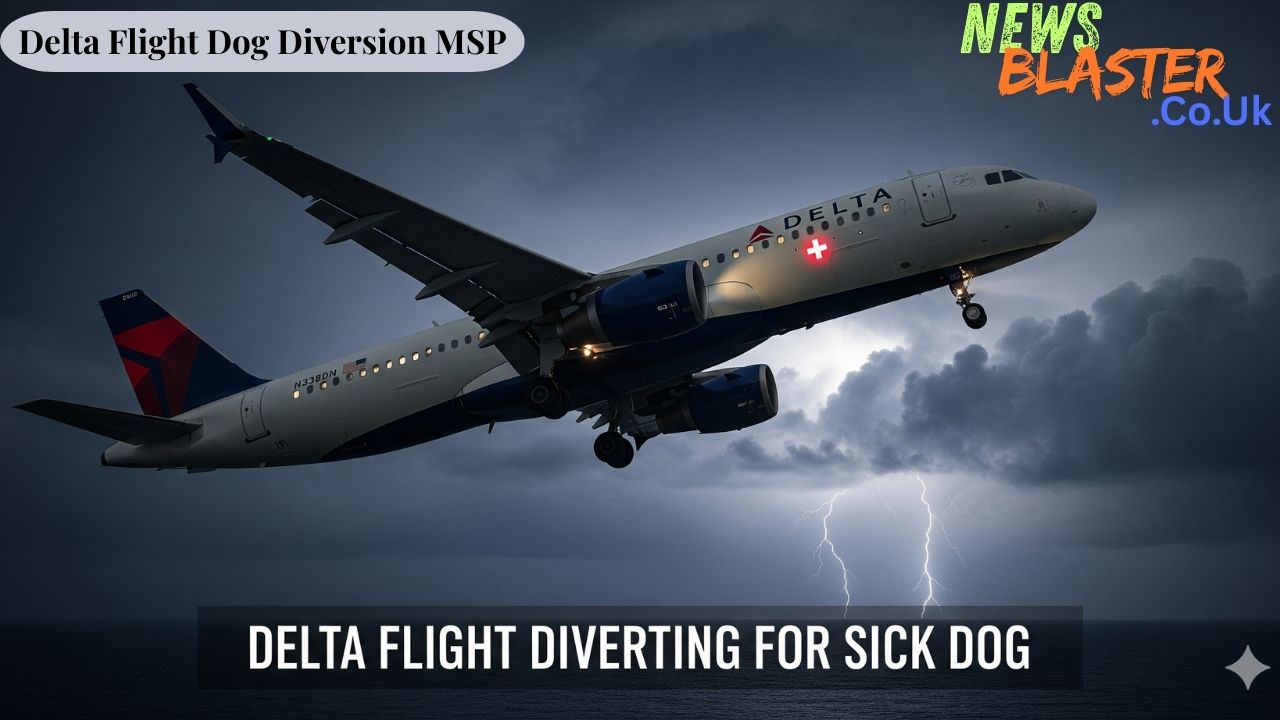Flight Details and Emergency Situation
In late May 2025, passengers aboard Delta Flight 694 experienced an unexpected journey when their routine trip from Detroit to Los Angeles took a dramatic turn. The delta flight dog diversion msp became headline news when the aircraft made an unscheduled landing at Minneapolis-St. Paul International Airport. What started as a typical cross-country flight quickly transformed into a life-saving mission for a four-legged passenger.
The delta flight dog diversion msp incident involved 181 passengers and 6 crew members who found themselves part of an extraordinary story of compassion at 30,000 feet. The cause of this unusual diversion wasn’t mechanical failure or severe weather, but rather a cabin pet that became seriously ill during the flight.
The Emergency Unfolds
As the delta flight diverted to minneapolis after dog became ill mid-flight, passengers witnessed firsthand how quickly priorities can shift in aviation. The pet’s condition deteriorated rapidly, prompting the flight crew to make a critical decision that would impact nearly 200 people on board. This delta flight dog diversion msp situation required immediate action from the experienced flight crew.
The Emergency Response

Critical Decision Making
When faced with a medical emergency involving a passenger’s companion animal, the flight crew had to weigh multiple factors. The decision to make a 300-mile detour to Minneapolis wasn’t taken lightly. The delta flight diverted to minneapolis after dog falls ill mid-flight, demonstrating the airline’s commitment to treating pets as valued members of the traveling party.
The delta flight dog diversion msp decision showcased the crew’s quick thinking to ensure that the animal would receive proper veterinary care at the earliest possible opportunity. Minneapolis-St. Paul International Airport was chosen as the diversion point due to its proximity and available medical facilities for animals.
Medical Response Team
Upon landing, medical professionals were standing by to provide immediate treatment to the distressed pet. The coordinated response showed how seriously the airline took the delta flight dog diversion msp situation. The delta flight diverted to minneapolis after dog falls ill mid-flight, and the emergency response team was ready to spring into action the moment the aircraft touched down.
Positive Outcome
Thanks to the swift action of the flight crew and the medical professionals on the ground, the animal ultimately recovered from its mid-flight medical emergency. This successful outcome validated the difficult decision behind the delta flight dog diversion msp and the delay it caused for so many passengers.
Impact on Passengers
Significant Delays
The compassionate diversion came at a cost to the other travelers on board. The delta flight diverted to minneapolis after dog falls ill mid-flight resulted in a substantial 2.5-hour delay for all 181 passengers. The flight eventually took off again at 10:30, continuing its journey to Los Angeles with everyone on board, including the now-stable four-legged passenger.
News of the delta flight dog diversion msp spread quickly among aviation communities and social media platforms, generating widespread discussion about airline priorities and passenger rights.
Understanding Passenger Disruption
While most travelers understood the humanitarian nature of the delay, the disruption was nonetheless significant. Passengers had to adjust their plans, potentially missing connecting flights or important appointments. The 181 travelers experienced everything from minor inconvenience to major schedule disruptions due to the delta flight dog diversion msp.
Financial Considerations
Beyond the human impact, the diversion carried substantial financial implications. The airline faced costs associated with additional fuel consumption, crew overtime, airport fees, and potential compensation for delayed passengers. These expenses highlighted the economic weight of such compassionate decisions like the delta flight dog diversion msp.
Delta’s Official Response

Company Statement
Delta Air Lines stood firmly behind their crew’s decision, releasing a statement that emphasized their core values. The airline declared that “the safety of our customers and people comes before everything else at Delta.” This statement reinforced their position regarding the delta flight dog diversion msp and that pets traveling with passengers are considered part of their customer family.
Policy Justification
The airline justified their response by explaining that ensuring proper care for cabin pets falls under their broader customer safety umbrella. This perspective treats companion animals not as cargo, but as valued members of the traveling party deserving of emergency medical attention when needed, as demonstrated in the delta flight dog diversion msp case.
Industry Context
Delta officials noted that while medical diversions don’t happen frequently, they certainly aren’t uncommon in the aviation industry. This context helped passengers and critics understand that emergency diversions like the delta flight dog diversion msp, while disruptive, are part of responsible airline operations.
Public Reaction and Debate
Defining Customers
The incident sparked interesting discussions about how airlines define their “customers.” The debate centered on whether pets should be considered customers deserving of the same emergency response as human passengers. This philosophical question went beyond simple policy to touch on deeper questions about the human-animal bond, especially in cases like the delta flight dog diversion msp.
Mixed Reactions
Public response to the diversion was notably divided. Some praised Delta for their compassionate response, viewing the delta flight dog diversion msp as evidence of the airline’s commitment to treating all passengers with care. Others questioned whether delaying nearly 200 people for one animal was proportionate or fair.
Balancing Compassion and Practicality
The delta flight dog diversion msp highlighted the ongoing challenge airlines face in balancing compassionate customer service with practical operational concerns. While most people support helping animals in distress, the scale of impact on other passengers raised questions about where to draw lines in emergency situations.
Industry and Policy Implications
Pet Travel Policies Under Scrutiny
This high-profile incident brought renewed attention to airline policies regarding pet travel. Questions arose about what level of medical care airlines should provide for cabin pets and under what circumstances diversions are justified. The delta flight dog diversion msp became a case study for industry analysts.
Establishing Protocols
The diversion raised important questions about standardizing protocols for pet medical emergencies. Different airlines might handle similar situations differently, leading to calls for more consistent industry-wide approaches to animal medical emergencies during flight, using cases like the delta flight dog diversion msp as reference points.
Cost and Responsibility
The financial impact of such diversions raised questions about who should bear the costs. Should pet owners carry insurance to cover potential diversion expenses? Should airlines absorb these costs as part of their pet-friendly policies? These questions remain largely unanswered following the delta flight dog diversion msp.
Setting Precedents
This incident may influence how future pet medical emergencies are handled across the aviation industry. The positive outcome and generally supportive public reaction could encourage other airlines to adopt similar compassionate approaches when facing situations like the delta flight dog diversion msp.
Conclusion
The delta flight dog diversion msp incident ultimately ended successfully, with the animal recovering and all passengers safely reaching their destination. While the 2.5-hour delay was inconvenient, it demonstrated something important about modern aviation’s evolving relationship with companion animals.
This event highlighted the complex decisions airlines face when balancing animal welfare with passenger convenience and operational efficiency. Delta’s choice to prioritize the pet’s well-being, despite the significant impact on other travelers, positioned them as a genuinely pet-friendly airline willing to act on their values even when it’s costly.
The ongoing discussion about this incident reflects broader societal questions about how we value animal welfare and what responsibilities businesses have toward the companions we bring into their care. As pet travel continues to grow, incidents like this will likely become more common, requiring clear policies and consistent approaches across the industry.
Ultimately, the successful resolution of this emergency serves as a testament to the compassion that can exist within commercial aviation, proving that sometimes doing the right thing means accepting inconvenience and cost for the greater good of all passengers – both human and animal.
Also Read: Delta Flight DL275 Diverted LAX Complete Incident Report and Analysis

